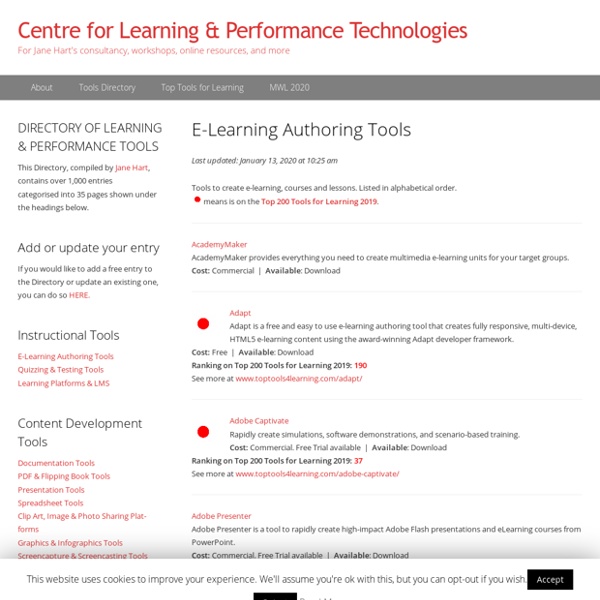



Elearning examples -- infographics, simulations, and online courses This page links to samples of interactive graphics, simulations, and other materials from many different sources. These are not examples of my work, and inclusion on this page doesn’t mean I endorse them. Maybe they’ll give you ideas for your own projects. More examples: See the elearning examples category on this site. Simpler interactions Storyplanet: Big River Rising These don’t need lots of Flash wizadry. More advanced interactions Blood Typing Game from Nobelprize.org The samples below include more complex navigation or sophisticated animation.Blood typing game. Choose a Different Ending from droptheweapons.org Simulations and branching scenarios For scenario design tips and more examples, see the scenarios category of this site.Connect with Haji Kamal. Vendor demonstrations Clearly Trained. Artistic and political Bear 71. More collections
Didattica e apprendimento Didattica e apprendimento Un luogo di discussione e riflessione epistemologica sugli strumenti, le strategie e le buone pratiche messe in campo dalle scuole che sperimentano percorsi di innovazione per migliorare gli apprendimenti e coniugare conoscenze, competenze e abilità. pagine 1 2 3 4 5 6 7 8 9 10 11 12 13 14 15 16 17 18 19 20 Il ‘non formale’ e la legge 107. Didattica e apprendimento di Micaela Ricciardi | del 28/10/2015 | 1 “Per realizzare una scuola aperta, quale laboratorio permanente di ricerca, sperimentazione e innovazione didattica … la presente legge dà piena attuazione all’autonomia delle istituzioni scolastiche”: così recita il primo capoverso del comma 1: un manifesto in cui non possiamo non riconoscerci. L’educazione non formale a EXPERIMENTA IV di Mario Fierli | del 21/10/2015 | 3 EXPERIMENTA è un’iniziativa del Comitato per lo Sviluppo della Cultura Scientifica e Tecnologica del MIUR. La disgrafia: una difficoltà da conoscere di Laura Barbirato | del 03/04/2015 | 6
ThePirateBay.org - Download unlimited torrents on Pirate Bay Practice-It!, a web-based Java practice problem tool for computer science students 9.1 Defining and Measuring Intelligence – Introduction to Psychology Learning Objectives Define intelligence and list the different types of intelligences psychologists study.Summarize the characteristics of a scientifically valid intelligence test.Outline the biological and environmental determinants of intelligence. Psychologists have long debated how to best conceptualize and measure intelligence (Sternberg, 2003). General (g) Versus Specific (s) Intelligences In the early 1900s, the French psychologist Alfred Binet (1857–1914) and his colleague Henri Simon (1872–1961) began working in Paris to develop a measure that would differentiate students who were expected to be better learners from students who were expected to be slower learners. Binet and Simon (Binet, Simon, & Town, 1915; Siegler, 1992) believed that the questions they asked their students, even though they were on the surface dissimilar, all assessed the basic abilities to understand, reason, and make judgments. Other researchers have proposed even more types of intelligences. Figure 9.2
What do High School students want from mobile tech? [Infographic] Based on statistics provided by PEW research, Nielsen, the National School Board Association and others, ASCD's infographic explores the connections between today's students, mobile learning and learning methods. The majority of Western schools attempt to ban the use of mobile devices; whereas a smaller number permit students to carry but not use the items. For many, suppressing such items becomes a losing battle -- as students continue to bring them, as well as parents preferring the option of being able to contact their children. According to the research, 63 percent of students attending schools carry their mobile devices despite the rules. Schools, in general, consider mobile devices a distraction and a way that more children experience bullying. Young people are becoming 'wired' and proficient with Internet use at an earlier age. For more information, view the infographic below: Related: